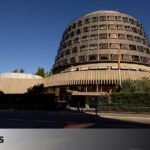
“More than 30 years of public service. Count picks in wins. And after four consecutive absolute majorities, he is the one who is going to remove Pedro Sánchez from the Palacio de la Moncloa. With you, the national president of the PP and next president of the Government of Spain: Alberto Núñez Feijóo”. This is how the conservative leader was presented at the inter-municipal convention with which the PP formally launched the campaign of the regional and municipal elections in February. It is a description that has been repeated in the last year and a half at party rallies, but heard now, after the fiasco of 23J that has left the PP knocked out, those presentations by Feijóo recently landed in Madrid after Casado’s assassination take on another dimension. , for what the leader of the PP was suggesting to his own.
From “repealing ‘sanchismo'” to desperately seeking his support: Feijóo’s turn after 23J
Further
“I told you when you made the mistake of electing me president of the PP, what is my vision of this party. I told you that I would make myself available to the party if we won again and if I do not succeed, I do not deserve to be president of the party”, Feijóo solemnized before the barons and candidates of the main cities. He then asked them to obtain an absolute majority, as he had done in Galicia, and therefore achieve a feat that he himself was not in a position to ensure for Spain.
Feijóo made it clear to his party since he took power a year and a half ago now that he only had one chance. In the retina of the conservatives, the ghost of Pablo Casado, who had been expelled from Genoa months before for the fratricidal war with Isabel Díaz Ayuso, but who had endured after obtaining in 2019 the worst result in the history of the PP, 66 seats, was still hovering. , and go up to 89 half a year later in the electoral repetition. Neither Mariano Rajoy nor José María Aznar had won the first time.
Although a sector of the party, which was already seen in Moncloa and even speculated on the names of the financial manager, has launched in a storm this week to defend its leader before the war drums that sound in the media right and in the the most ultra wing of the party embodied by Esperanza Aguirre, who has not let a week go by to launch the name of Ayuso as the future of the party. Analyzed with perspective, the phrase does not age so badly for the popular leader: Feijóo has won the elections. But he has no options to be president. At least this legislature.
It is in that “at least” that his firm defenders see the trick, among them the Andalusian president, Juan Manuel Moreno Bonilla, who on the same election night came out in defense of Feijóo to short-circuit any hint of internal crisis that could come from the Puerta del Sol. At the moment no one believes that Isabel Díaz Ayuso is on that screen. The Madrid president has been forced to come out publicly to say that she does not make sense to “throw over a bridge” (the expression is literal) the leader of her party and that she closes ranks with the national president. Another thing is that she has already marked the path of what she must do at the investiture and even in case of going to the opposition.
Accustomed to the defeats of the PP in Andalusia before staying in San Telmo with a historic absolute majority, Moreno Bonilla was one of those who did not look favorably on Feijóo’s threat of abandonment. And that is where the phrases pronounced these months by the leader of the PP age worse. Is winning the same as governing? Feijóo is not used to opposition work and it was not his promise when he arrived in Madrid, after having resigned in tears years before, to stay out of the blue bench that the Government occupies.
Feijóo suggested to his people that he was gambling everything on heads or tails. That he only had one chance. And in a way it still is. In the short or medium term, Feijóo is risking it: either he reaches Moncloa or he can go down in history as the most ephemeral leader in the history of the PP, even ahead of Hernández Mancha who barely survived two years at the helm of Alianza Popular (from February 1987 to January 1989). For the moment, both he and the leadership of his party are determined to endure the scenarios that open up after 23J and that, without being dreamed of, still leave a loophole for his hope.
Although the PSOE is publicly convinced that Sánchez will achieve the investiture thanks to the support of the entire parliamentary arc -with the exception of PP, Vox, UPN and the Canary Islands Coalition- and the abstention of Junts, the Catalan independentistas have not given any sign for now to be in that equation. Feijóo wants to appear at the investiture, even if it is unsuccessful, to shorten the negotiation times.
The PP has insisted this week on that idea and has claimed Feijóo’s right to govern for having been the most voted for. In addition, they have presented as advances the resignation of Vox to enter the Government and the will of the Canary Islands Coalition to sit down and talk. However, the alleged advances add up to exactly the same votes as the same night of the elections, when everyone gave those parties favorable to an investiture of the leader of the PP. The truth is that right now Feijóo has not managed to get close to an absolute majority and he has no option.
And it is that in an electoral repetition the conservatives are convinced that they would have more options to wrest power from Sánchez. A part of the media right now points out that Vox should give up appearing in certain places where it has not obtained representation by ‘stealing’ possibilities from the PP. For example, in provinces such as La Rioja or Burgos, those of Feijóo used the strategy of the useful vote so that the votes of the right would concentrate around their initials to snatch seats from the PSOE and that instead of a 2-2 draw the result was 3-1. But it did not work in all cases.
“Without a doubt the division of the center-right vote has been an element that has harmed the PP from having a more sufficient majority. If we had achieved that appeal to unite the vote around the PP, the result would have been better, ”said the president of Castilla y León, Alfonso Fernández Mañueco, in full electoral hangover.
There are sectors of the PP that even consider that Feijóo should remain as head of the opposition in the event that Sánchez obtains the support to carry out the investiture. They do not give two hard for the continuity and stability of that reissued coalition that the popular ones intend to face with even more harshness using the absolute majority in the Senate and the regional and municipal power achieved on 28M. That plan B foresees a short legislature with the confidence that with the numbers from 23J, even achieving the investiture, the third Government of Sánchez cannot last and his mandate will precipitate new early elections. In this scenario, changing the candidate, for the second time in just two years, could be counterproductive for the party. Although his career in Madrid is not going as smoothly as expected, Feijóo still has a bullet left to play it all or nothing.
—————————————
How to stop the lies
The 23J campaign has made clear the tremendous importance of the free press, which depends on its readers and owes nothing to anyone else. The vast majority of the big media are owned by banks, funds and large communication groups. The vast majority of them have whitewashed the ultras and are under the control of the agenda set by the right.
That is why we ask for your support. We need to grow. Hire more journalists. Reinforce our local editions against the lies of the local and regional governments of the extreme right. Sign more investigative reporters. We need to reach more people, build a bigger newspaper, capable of countering the brutal wave of conservative propaganda that we are going to face. And that will leave small what we have experienced in this dirty electoral campaign.
If you care about the future of this country, support us. Today we need you more than ever because our work is more necessary than ever. Become a member, become a member, of elDiario.es
Source: www.eldiario.es

